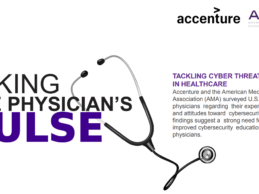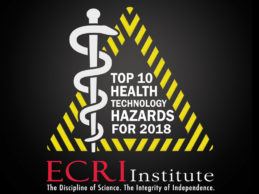Ransomware attacks continue to wreak havoc on all types of organizations across almost every industry. The healthcare sector in particular has emerged as one of the top targets for ransomware gangs, and the impact can be more dire than for most others. According to new research by Tenable, ransomware is responsible for 46% of all data breaches in the healthcare sector, compared to 35% of data breaches across all verticals.
Just last month, a major hospital in Maryland lost access to a
Read More
Healthcare Ransomware
Death by Ransomware: Poor Healthcare Cybersecurity
If hackers attack your organization and you’re in an industry such as financial services, engineering, or manufacturing your risks are mostly monetary. But when it comes to healthcare cybersecurity, not only is there significant financial jeopardy, people’s health and wellbeing are also at risk so the stakes are much, much higher.
According to the Department of Health and Human Services, there has been an almost 50 percent increase in healthcare cybersecurity data breaches between February
Read More
Hackers in Healthcare: What Damage Could They Do With Your Medical Data?
Conversa Health’s Scott Anderson provides a brief take on the state of data security in healthcare.The wave that is big-data doesn’t appear to be cresting in healthcare anytime soon, and unfortunately, neither are the threats waged against it. Hijacking and hacking into personal health information (PHI) has become a growing trend that’s here to stay. So, the question remains: what should be done about it?The last couple of years have unveiled a fair share of data breaches in healthcare: in 2017,
Read More
Protecting Medical Device Security in the Age of Ransomware
From medication pumps to pacemakers, people depend on lifesaving devices to live their healthiest possible lives and manage chronic ailments. Many of those patients likely hear about cybercriminals orchestrating massive data breaches, and might get concerned about one of those incidents compromising their information.However, they probably haven’t considered the hackers might target the devices in their bodies or the ones they otherwise use for better well-being.Hospitals Must Pay Attention to
Read More
Healthcare Cyber Hygiene: 5 Best Practices to Protect Patient Data
Hospital-acquired infections and data breaches may have vastly different causes, but they have one thing in common—they put healthcare organizations and patients at risk. The “pathogens” which cause data breaches originate both externally and internally—but practicing healthcare cyber hygiene can reduce or eliminate their “infection."Patient data has high value—to others. According to Verizon’s 2017 Data Breach Investigations Report, healthcare has the second highest number of breaches after
Read More
4 Leading Health IT Trends That Will Continue in 2018
Several notable trends from 2017 will continue to impact the health information technology (HIT) industry in the new year. Ransomware tops the list, particularly after this May’s WannaCry worldwide cyberattack, followed closely by increased awareness of electronic prescribing of controlled substances (EPCS) as an “upstream solution” to battling the nation’s mounting opioid abuse crisis. Beyond the ongoing development of these two leading trends, HIT experts are also asking two key questions as
Read More
Survey: 4 in 5 Physicians Experienced Cyberattacks In Their Clinical Practices
More than four in five U.S. physicians (83 percent) have experienced some form of a cybersecurity attack, according to new research released today by Accenture and the American Medical Association (AMA). The key findings reveal physicians see need for the healthcare industry to increase cybersecurity support for medical practices in their communities. More than half (55 percent) of the physicians were very or extremely concerned about future cyberattacks in their practice. In addition,
Read More
Ransomware Tops ECRI Institute’s 2018 Top 10 Health Technology Hazards List
Ransomware and other cybersecurity threats to healthcare delivery has topped ECRI Institute’s Top 10 Health Technology Hazards for 2018 list. Ransomeware are potential patient safety crises that can disrupt healthcare delivery operations, placing patients at risk. Ransomware attacks can lead to canceled procedures and altered workflows (e.g., reverting to paper records). They can also damage equipment and systems, expose sensitive data, and force closures of entire care units. Ultimately, they
Read More
Why It’s Time for Hospitals to Become Immune to Ransomware
Editor's Note: Greg Maudsley is a cyber security expert at Menlo Security, a Silicon Valley-based cyber security company that protects organizations from cyber attack by eliminating the threat of malware.Hospitals and other healthcare organizations (HCOs) are increasingly singled out by cyber criminals for ransomware and other attacks. Not only are patients’ sensitive records being targeted, but also – as the FBI warns – their intellectual property or credit card information. The
Read More
5 Lessons Learned From The WannaCry Ransomware Attacks for Hospitals
Editor's Note: Richard Sullivan is chief government and revenue officer for Medsphere Systems Corporation, the solution provider for the OpenVista electronic health record.Will information technology ever realize an imagined future where security is strong enough, reliable enough, secure enough to block any and all attacks?It’s a dubious proposition made more uncertain by the recent WannaCry ransomware incident that started a couple of weeks ago and continued around the globe for several days.
Read More









